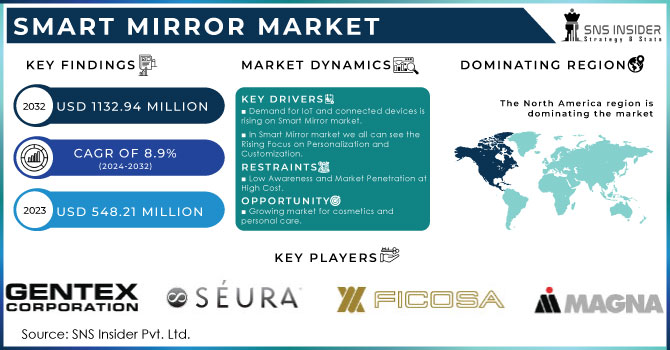Smart Mirror Market Size & Trends:
The Smart Mirror Market Size was valued at USD 548.21 million in 2023 and is expected to reach at USD 1132.94 million in 2032, grow at a CAGR of 8.9% over the forecast period of 2024-2032.
The smart mirror market is rapidly expanding due to a combination of factors that cater to various consumer demands. These devices are smoothly becoming a part of different areas of daily life, including homes, vehicles, and retail settings. The market is growing due to the appeal of smart homes from brands like Kohler, along with progress in automotive technology and potential healthcare uses.

To get more information on Smart Mirror Market - Request Sample Report
Despite obstacles like cost and privacy issues, the retail sector is at the forefront of incorporating smart mirrors. Companies such as Zero10 are changing shopping experiences by providing virtual try-on technology, which has caught the attention of big brands like Tommy Hilfiger and Macy's. The smart mirror sector is a combination of various industries like IT services, electronics manufacturing, healthcare, and marketing. The market is constantly changing and growing with 373 companies and USD 1.7 billion in funding. Even though news coverage may vary, positive trends in search interest, workforce growth, and ongoing investment suggest a bright future for smart mirror technology.
The smart mirror market is experiencing rapid growth fueled by innovative technologies and evolving consumer preferences. The integration of Virtual Reality (VR) and Augmented Reality (AR) has transformed smart mirrors into interactive platforms, enabling virtual try-ons of beauty products, clothing, and hairstyles. This immersive experience is driving consumer interest and market expansion. Additionally, advancements in display technology, such as flexible and curved monitors, are enhancing the aesthetic appeal of smart mirrors, making them more desirable for both residential and commercial spaces. The wellness trend is also impacting the market, as smart mirrors incorporating fitness tracking, health monitoring, and interactive workout sessions gain popularity. These factors collectively contribute to the growth and diversification of the smart mirror industry.
Smart Mirror Market Dynamics
Drivers
The Smart Mirror Market Reflects Innovation and Consumer Demand
The smart mirror market is rapidly growing due to the merging of technology and consumer lifestyle choices. These mirrors come with a variety of features like voice assistance, content streaming, social media integration, and app compatibility, improving user experience and convenience. The market growth is being driven by the incorporation of cutting-edge technologies such as AR/VR and computer vision, exemplified by products like Wellnesys Inc.'s ARIA smart mirror. The increasing focus on health and working from home has boosted the need, demonstrated by Lulu lemon’s purchase of Mirror for USD 500 million in June 2020. With consumers looking to simplify their everyday tasks and adopt new ideas, the smart mirror industry is set to grow further, especially in advanced countries.
Consumer preferences that are changing over time are fueling the growth of the smart mirror market.
The surge in e-commerce has transformed how consumers shop, leading traditional stores to embrace digital changes. A survey by IBM of almost 20,000 customers highlights this pattern, indicating an increasing preference for smooth experiences both online and in physical stores. This change offers a substantial chance for the smart mirror industry. Smart mirrors combine physical and digital shopping by providing virtual try-on technology, displaying product information, and showing targeted advertising. This interactive experience is designed to meet the changing consumer desire for convenience and personalization. Furthermore, the expected price range for Baracoda's smart mirror, estimated at USD500-1000 (equivalent to approximately RUSD4,891.20), indicates the possibility of a broader market reach. In an effort to cater to evolving consumer needs, retailers are focusing on the smart mirror market to facilitate growth by using technology to connect online and in-store shopping.
Restraints
Issues related to privacy in the smart mirror Market
Significant privacy concerns have been raised due to the incorporation of advanced technologies in smart mirrors. These gadgets can gather and assess vast amounts of personal information, such as shopping patterns, monetary tendencies, and engagements with store staff. Smart mirrors in retail environments have the capability to gather private data such as buying habits and preferences in order to create personalized consumer profiles for focused advertising. Although this gathering of data allows for customized experiences, it also comes with the threat of data breaches and misuse. Ensuring consumer trust and long-term market success will be crucial as the smart mirror market continues to grow and face privacy challenges.
Obstacles and limitations in the Smart Mirror Market
The smart mirror market is experiencing significant obstacles that hinder its expansion. The primary worry is the increased focus on data protection and security. Intelligent mirrors, due to their characteristics, gather and save large quantities of personal data, which makes them appealing to cyber-attacks. The possibility of data breaches and inappropriate use can diminish consumer confidence and hinder acceptance, especially in areas with strict data protection laws such as the GDPR and CCPA. Additionally, the expensive price of smart mirrors, including the initial buying cost and regular upkeep, acts as a significant obstacle for residential and commercial buyers. The combination of this financial strain and concerns about potential risks may restrict market access and impede the widespread implementation of this technology.
Smart Mirror Market Segmentation Overview
By Installation Type
Based on Installation Type, Wall-Mounted dominated the smart mirror market with 85.50% share in 2023.The increasing demand for wall-mounted smart mirrors is driving significant growth in the smart mirror market. Consumers are more inclined towards this type of installation because of safety, space-saving features, and visual attractiveness in comparison to freestanding choices. The increased price of smart mirrors frequently results in a preference for wall-mounted versions in order to make the most of the investment. Moreover, the increasing popularity of smart homes is driving the need for smart bathroom and kitchen mirrors, usually mounted on walls for safety and space reasons. Companies like Kohler are meeting this trend by offering innovative products such as the Verdera Voice smart mirror, which comes with Google Assistant integration. All of these factors work together to fuel the quick growth of the wall-mounted smart mirror sector.
By Distribution Channel
Based on Distribution Channel, Offline dominated the smart mirror market 74.60% of share in 2023. Although e-commerce has expanded, physical stores still appeal to shoppers. Per Raydiant's 2020 State of Consumer Behavior Report, 33% of consumers favor shopping in physical stores to view products in person, and 26% appreciate the retail experience as a whole. Instant product gratification is a major attraction for 13% of customers. Although e-commerce is expected to grow, the lasting attraction of brick-and-mortar stores, fueled by tangible product engagement and instant satisfaction, guarantees its ongoing importance in the retail industry.
Smart Mirror Market Regional Analysis
North America held the majority of the smart mirror market in 2023, accounting for 49% of the market share. The segment is poised to maintain its leadership position due to increasing household formations and a growing preference for healthy beverages. A surge in manufacturers and technological advancements is fueling market expansion. The region is experiencing robust growth driven by rising demand for diverse smart mirror offerings. Major tech companies are investing in smart mirror technology, aligning with the broader smart home trend, and creating new market opportunities.
Europe is the second fastest growing region in smart mirror market with 21% of share in 2023. Europe's affluent population and early adoption of smart technologies have positioned the region as a dominant force in the smart mirror market. The retail sector is a key driver, with major brands in the UK and Italy integrating smart mirrors to enhance customer experiences. North America held the majority of the smart mirror market in 2023, accounting for 49% of the market share. Innovative solutions offered by electric mirror companies have contributed to the widespread adoption of these devices across European homes and commercial establishments.

Need any customization data on Smart Mirror Market - Enquiry Now
Key Players
Some of the major key players in Smart Mirror market along with their product:
-
Gentex Corporation (Automotive Mirrors, Smart Mirrors)
-
Ficosa (Rearview Mirrors, Advanced Driver Assistance Systems)
-
Seura Solution (Mirrors with integrated technology, Smart Mirrors)
-
Magna International (Mirrors, Automotive Components)
-
Japan Display Inc. (Display Panels, Automotive Displays)
-
Murakami Kaimeido (Automotive Mirrors)
-
Harman International Industries (Infotainment Systems, Smart Audio Systems)
-
ELECTRIC MIRROR, INC. (Vanity Mirrors, Smart Mirrors)
-
Evervue USA Inc. (Smart Mirrors, Digital Bathroom Mirrors)
-
AVIS Electronics Company (Automotive Mirrors, Electronic Components)
List of Suppliers Who provide Raw Material and Component in Smart Mirror Market:
-
3M
-
Corning Inc.
-
Asahi Glass Co. (AGC)
-
Saint-Gobain
-
LG Chem
-
Toray Industries
-
BASF
-
Sumitomo Chemical
-
DuPont
Recent Development
-
In May 2023,Gentex Corp. invested in ADASKY's LWIR sensor technology for automotive safety.
-
In January 2023,Magna launched Clear View vision system combining camera and mirror technology for improved visibility in Ram trucks.
-
In May 2022, H&M piloted smart mirrors with product identification and styling recommendations in US COS stores.
-
in January 2022, MySize introduced a smart mirror for virtual try-ons and fit recommendations.
| Report Attributes | Details |
| Market Size in 2023 | USD 548.21 Million |
| Market Size by 2032 | USD 1132.94 Million |
| CAGR | CAGR of 8.9% From 2024 to 2032 |
| Base Year | 2023 |
| Forecast Period | 2024-2032 |
| Historical Data | 2020-2022 |
| Report Scope & Coverage | Market Size, Segments Analysis, Competitive Landscape, Regional Analysis, DROC & SWOT Analysis, Forecast Outlook |
| Key Segments | • By Installation (Mounted on the wall, Free-Standing) • By Application (Residential, Commercia) • By Distribution Channel (Online, Offline) |
| Regional Analysis/Coverage | North America (USA, Canada, Mexico), Europe (Germany, UK, France, Italy, Spain, Netherlands, Rest of Europe), Asia-Pacific (Japan, South Korea, China, India, Australia, Rest of Asia-Pacific), The Middle East & Africa (Israel, UAE, South Africa, Rest of Middle East & Africa), Latin America (Brazil, Argentina, Rest of Latin America) |
| Company Profiles |
Gentex Corporation (US), Ficosa (Spain), Seura Solution (US), Magna International (Canada), Japan Display Inc. (Japan), Murakami Kaimeido (Japan), Harman international industries (US) and other players. |
|
Key Drivers |
• The Smart Mirror Market Reflects Innovation and Consumer Demand. • Consumer preferences that are changing over time are fueling the growth of the smart mirror market. |
|
Market Restraints |
• Issues related to privacy in the smart mirror Market. • Obstacles and limitations in the Smart Mirror Market. |

